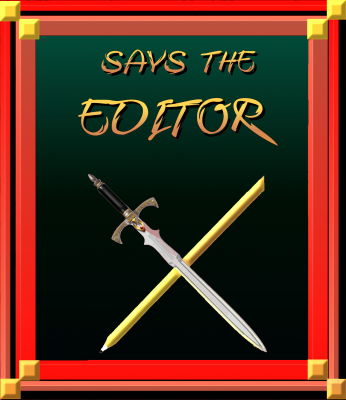May 22, 2019

Been doing a ton of samples lately. Prospective clients. Summer approaches.
Noticed a trend. Big one.
Sending a lot of samples back with message: “I can work on this now, but I think your money’s more wisely spent if you take some time and fix these sentence fragments. If you’re stuck and need help, let’s talk about a pricing structure and coaching sessions that’ll help you improve this area of your craft.”
I don’t know where this trend is coming from, what’s fueling it. If authors are in such a rush that they aren’t paying attention to the simple formation of a sentence (and really, there’s rarely anything truly simple about a sentence). If their beta readers or critique groups or partners aren’t calling them out on this, whether from expediency or because they think it’s not their job (it is), or from simple ignorance of what constitutes good writing.
I can come up with a million reasons for why this is happening.
Ultimately, I don’t care what those reasons are, to be honest.
I want to see good writing crossing my desk. The kind that the author has worked on, paid close attention to, done his/her/their absolute best by, and then they’ve taken the time to learn some more, rolled their sleeves back up, and went deep yet again.
It’s not because I’m a snob. That I only want to work with the best. That’s not it at all.
Far from it. Some of my favorite clients are the ones who bring me a rough manuscript and then, as we work together, their craft improves. They do the hard work, and their pages reflect that, and the story reflects that, and then their readership reflects it, too.
Do you see the key? Have you picked up on what I’m stressing here?
Doing the hard work. Learning the craft. Doing the hard work.
Doing.
The.
Hard.
Work.
That means writing in full sentences. Sentences are powerful things, but if you cut them off at the knees, if you truncate them, you’re taking their power away. And in a novel, sentences are all you’ve got. They are the everything. The only thing more important are the words, themselves, that make up those sentences.
So yes. I’m trying to give these authors choices. I’m trying to save them some money — editing isn’t cheap, and I am a not cheap editor within the field. If you want to work together in a coaching situation, I’m more than glad to. Not because it’s lucrative for me, but because it’s important that you learn these skills, especially the basic ones. And because as you master them, your money is better spent when my editor’s eye can turn from the basics of writing to the more nuanced use of words and other elements of fiction: Plot. Setting. Pacing. Characterization. And the detail work, the timeline, the grammar, the echo words, your character’s eye color, the unusual spelling of your main character’s father’s name…
Slow down. Take your time. Don’t rush to publication; that never goes well.
Do the hard work. Work on your craft.
But if you need help, ask for THAT. Don’t pay me for an edit in which I have to call out 75% of your manuscript because the sentence fragments don’t work, even stylisticly. It’s a poor use of your money and a poor use of my time.
Do the hard work.
If you need help understanding how/why sentence fragments are a problem, ask. I’ll answer. I’m glad to work with you and teach you how to spot them, how to remove them, how to write better prose that readers will love.
Do the hard work.
Good luck.
Leave a Reply